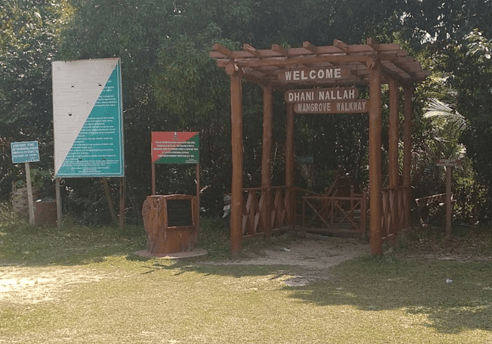Exploring Dhani Nallah: A Hidden Gem in Rangat, Andaman and Nicobar Islands


Introduction to Dhani Nallah
Nestled within the serene Rangat region of the Andaman and Nicobar Islands, Dhani Nallah stands out as an extraordinary destination, showcasing the area's remarkable natural beauty and unique ecosystem. This tranquil locale is characterized by lush greenery, pristine waters, and a rich biodiversity that captivates both locals and tourists alike. The amalgamation of diverse flora and fauna creates an environment that is not only visually appealing but also ecologically significant.
Dhani Nallah is situated on the western coast of Middle Andaman, strategically positioned to serve as a gateway to various natural attractions. Its lush mangroves act as vital protective barriers, offering habitat for numerous species, including migratory birds, which enrich the biodiversity of the region. The area is recognized for its remarkable entomological diversity as well, with various species of butterflies frequently spotted in its verdant surroundings. This ecological richness makes Dhani Nallah a valuable site for researchers and nature enthusiasts eager to explore and understand local wildlife.
Beyond its ecological significance, Dhani Nallah holds cultural importance as well. The region is home to several indigenous communities, each contributing to the rich tapestry of traditions and customs that define the Andaman and Nicobar Islands. Visitors to Dhani Nallah can experience local lifestyles, partake in time-honored practices, and relish authentic culinary offerings, further enhancing the area's attraction. This blend of natural beauty and cultural heritage establishes Dhani Nallah as a must-visit location, setting the groundwork for a deeper exploration of its unique offerings in the following sections.
The Nature and Wildlife of Dhani Nallah
Dhani Nallah, nestled within the pristine landscapes of Rangat in the Andaman and Nicobar Islands, showcases an incredible diversity of flora and fauna that captivates the imagination of nature enthusiasts. The region's rich biodiversity stems from its unique climatic conditions and geographical features, making it a haven for various species. The lush green forests surrounding Dhani Nallah are primarily dominated by evergreen and deciduous trees, creating a vibrant ecosystem that supports a myriad of wildlife.
Flora in Dhani Nallah includes endemic species such as the Andaman Padauk and various types of mangroves, which play a crucial role in maintaining the ecological balance. The diverse plant life provides essential habitats and food sources for numerous animal species, some of which are found nowhere else in the world. For instance, the forest is home to rare birds like the Nicobar pigeon and the Andaman woodpecker, drawing birdwatchers seeking to observe these unique avian inhabitants.
In addition to its avian richness, Dhani Nallah's wildlife extends to various mammals and reptiles, enhancing its ecological significance. The area is frequented by several species of lizards, snakes, and amphibians that thrive in the humid environment. Wildlife enthusiasts will also appreciate the opportunity to spot the elusive Nicobar langur and monitor lizards that inhabit the region.
Outdoor activities abound for those looking to immerse themselves in Dhani Nallah’s natural beauty. Bird watching, hiking, and eco-tourism opportunities allow visitors to engage with the environment responsibly. Hiking trails winding through the picturesque surroundings provide breathtaking views and close encounters with the stunning biodiversity that flourishes in this hidden gem. The preservation of such habitats is vital for maintaining these species and their ecosystems, ensuring that future generations can enjoy the wonders of Dhani Nallah.
Cultural Aspects and Local Community
Dhani Nallah, tucked away in the serene Rangat region of the Andaman and Nicobar Islands, is not only a natural wonder but also a treasure trove of cultural heritage. The local communities, primarily consisting of indigenous tribes, have a profound connection to their surroundings, reflected in their traditions, lifestyles, and practices. These communities engage in sustainable living, harmonizing their daily activities with the environmental rhythms of the region.
One of the defining characteristics of the local culture is the strong emphasis on community and family bonds. Traditional practices are passed down through generations, ensuring the preservation of cultural identity. The locals partake in various rituals and celebrations that highlight their respect for nature and its resources. Festivals play an important role in the community's social fabric, with events often revolving around agricultural cycles, fishing, and harvesting, showcasing the integral relationship between the people and their environment.
Cuisine in Dhani Nallah reflects the bounty of the land and sea, featuring an array of dishes that utilize locally sourced ingredients. Visitors can savor traditional meals prepared with fresh fish, tropical fruits, and spices, offering a glimpse into the culinary heritage of the area. Cooking methods are often traditional, emphasizing methods like grilling and steaming, which enhance the natural flavors of the food.
The craftsmanship of the local community is equally notable, with artisans producing intricate handicrafts ranging from woven baskets to wooden carvings. These crafts often utilize materials that are sustainable, aligning with the community's philosophy of respecting their environment. As visitors explore Dhani Nallah, they encounter not just unique artistic expressions but also stories that highlight the locals' intimate connection with their land.
The culture of Dhani Nallah, encompassing its traditions, cuisine, and craftsmanship, presents visitors with an authentic experience of life in this hidden gem of the Andaman and Nicobar Islands. This rich cultural tapestry is an invitation to appreciate the harmony existing between the local community and their natural surroundings.
Visiting Dhani Nallah: Tips and Recommendations
When planning a visit to Dhani Nallah, it is essential to consider the best times to experience this captivating location. The ideal period for travelers is between November and April, when the weather is pleasant and conducive for outdoor activities. During these months, the humidity levels are lower, and the temperature remains comfortable, making it easier to explore the natural beauty and rich culture that Dhani Nallah has to offer.
Transportation options to Dhani Nallah typically involve reaching Rangat first, which is accessible via ferries or flights to Port Blair, followed by a road trip. From Rangat, local taxis and buses are available, providing a convenient way to reach Dhani Nallah. It is advisable to negotiate fares in advance, as many drivers may not use meters.
Accommodation near Dhani Nallah primarily includes guesthouses and eco-resorts, which provide comfortable lodging while allowing visitors to enjoy the serene environment. It is prudent to book your stay in advance, especially during peak tourist seasons, to secure the best options. Additionally, travelers should be aware of any necessary permits required for entry, as certain areas in the Andaman and Nicobar Islands have regulations in place to protect the local ecosystem and indigenous communities.
While visiting Dhani Nallah, it is important to pack appropriately. Essential items include sturdy walking shoes, insect repellent, sunblock, and reusable water bottles to minimize plastic usage. Respecting the environment is crucial; therefore, it is advisable to adhere to local guidelines regarding wildlife and natural habitats. Visitors should aim to leave no trace, ensuring that this hidden gem retains its charm for future travelers. Being mindful of local customs and cultures further enhances the experience, allowing for a more respectful and memorable trip to Dhani Nallah.
Customer support
Timing
Monday to Saturday
10:00 AM to 07:00 PM
Head Office
The Vibe Hunters
Old pharagoan, near mahakali garrage, Dollygunj,
Sri Vijaya Puram, Andaman and Nicobar Islands 744103
Branch Office
AJAA Travels
Van Bhavan, North, Navin Nagar, Subashgram,
Diglipur, Andaman and Nicobar Islands 744202


All Right Reserved
The Vibe Hunters
